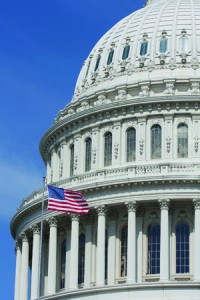 So now yet another manufactured crisis has ended, and we’ll see if we have another one by Feb. 8.
So now yet another manufactured crisis has ended, and we’ll see if we have another one by Feb. 8.
Here’s how the process should work: Congress should prepare a budget once a year – once – that spells out the nation’s taxing and spending priorities, and then it should make sure its numbers add up. Instead, it lurches from one unnecessary deadline to another, putting off the hard choices and adding debt. This past week’s was the 113th time since 1998 that Congress has passed a temporary funding measure, and this one’s tax cuts will add $31 billion to the deficit – about $100 for every American.
Both sides are at fault for Washington’s toxic atmosphere, but Senate Democrats are mostly to blame for this particular shutdown. They filibustered the funding bill in order to gain concessions for the 700,000 young people brought to America illegally as children – the beneficiaries of the Deferred Action for Childhood Arrivals program, or DACA. In the end, all they got in return was a promise that the issue will be debated in the Senate, which was probably going to happen anyway. Continue reading Whose fault? This time, Senate Democrats

